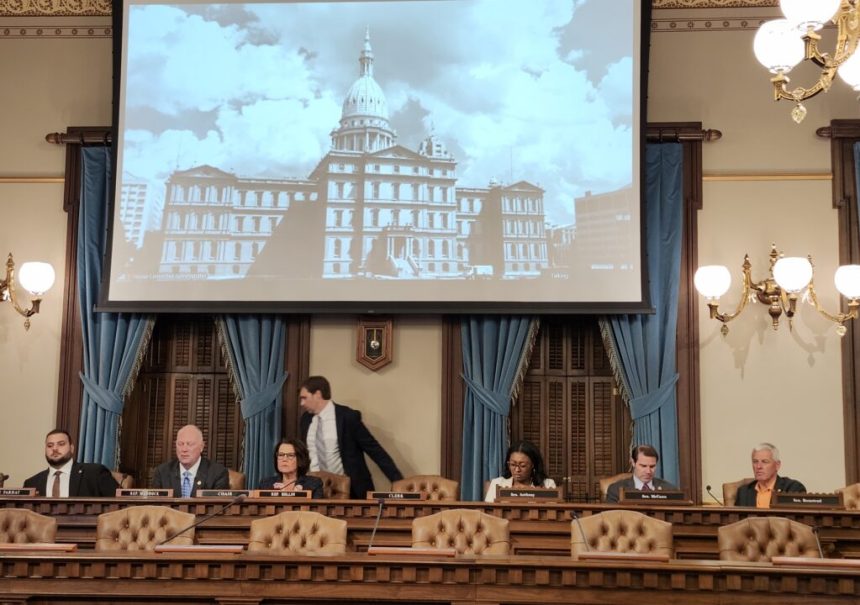The Michigan House/Senate Conference Committee meeting on Thursday, Oct. 2, 2025 as legislators try to work through a new state budget. | Photo by Ben Solis/Michigan Advance
The Michigan House Of Representatives on Thursday night approved what was described as a compromise budget to fund the government and its agencies at $51.8 billion, with $12.5 billion going out of the General Fund, according to the House’s fiscal analysis of the general omnibus budget.
With school aid and higher education added in, a vote that will take place later, the total budget will likely be around $80 billion. That will still come under last year’s spending plan of $82 billion.
The budget also eliminates around 2,000 unfilled positions, also referred to as FTEs, a win for House Republicans and their “phantom jobs” concept.
The bill now moves to the Senate, but is unclear if the upper chamber is ready to vote.
State Rep. Alabas Farhat (D-Dearborn) said on the House floor that the two chambers came together to create a budget that shows big things can still be done when Democrats and Republicans work together.
Farhat said he was proud that the budget protects health care and SNAP funding, as well as a 20% raise for Department of State Police troopers.
“Albeit, this budget is not perfect … but it is what we were sent here to do, to be deliberative,” Farhat said. “We were sent here to work together. I do not see a Democrat or Republican budget. I see a budget that works for Michigan.”
State Rep. Alabas Farhat (D-Dearborn), at left, speaking with State Reps. Ann Bollin (R-Brighton Township) and Matt Maddock (R-Milford) on Thursday, Oct. 2, 2025 as the Legislature worked on a new state budget. | Photo by Ben Solis/Michigan Advance
GOP claims wins on transparency and spending resets
State Rep. Ann Bollin (R-Brighton Township), chair of the House Appropriations Committee, said House Republicans obviously did things differently than in recent years, which included a deep dive into alleged fraud and waste, and that took considerable time. She also said the budget now clearly details how departments are spending their money, adding transparency that was lacking, and would bring back workers to Lansing after the pandemic era when many of them were working remotely.
“The budget finally addresses that problem in a serious way,” Bollin said. “We reset our priorities to meet needs across Michigan. … From the beginning, I’ve said we don’t have to gut it, we just need to cut it.”
She said sometimes the budget process can be difficult, and although there was much bomb throwing throughout the process, Bollin said the respective parties were able to set their differences aside to deliver a budget that was fiscally responsible, but also sustainable.
The budget passed the House on a 101-8 vote, with most of the defections occurring on the Republican side. At least one Democrat, state Rep. Dylan Wegela of Garden City, voted no.
House Minority Leader Ranjeev Puri (D-Canton) said it appeared that the Republicans needed their help getting across the finish line after all — a call back to House Speaker Matt Hall’s commentary early in the cycle when he said he didn’t need House Democrats to get the budget done.
Puri noted that more Democrats voted in favor of the budget than Republicans: State Reps. Steve Carra of Three Rivers, James DeSana of Carleton, Jaime Greene of Richmond, Phil Green of Watertown, Gregory Alexander of Carsonville, Timmy Beson of Bay City and Brad Paquette of Niles voted against the bill.
Democratic Rep. Karen Whitsett of Detroit was not present for the vote.
Hall hailed the “ghost jobs” that were eliminated, saying he was mocked on that concept throughout the budget cycle, but that he ended up being right and did so without having to lay off any state workers.
He also said that his push for transparency on earmarks eventually won the day, as the Senate was compelled to release all its earmark spending in a hearing before the omnibus budget moved on Thursday. He said that would not have happened if it wasn’t for him and Bollin holding the Senate’s feet to the fire.
“This budget is really about value for the dollars, whether it passed before or after [the statutory deadline or the constitutional deadline],” Hall said to reporters after the vote. “If I would have surrendered to the Democrats and allowed all that pork in this budget, the voters would have not preferred that budget. … I don’t think any of you believed I was really going to get that done, be we did. Now we’ve got to improve on it next year.”

Michigan House Speaker Matt Hall (R-Richland Township) on Thursday, Oct. 2, 2025 as the Legislature worked on a new state budget. | Photo by Ben Solis/Michigan Advance
The spending plan contains some steep cuts, reducing all ongoing General Fund dollars for departmental budgets by $360 million. That was countered by an additional $425 million in one-time General Fund dollars.
There is a particularly large hit to the Department of Health and Human Services compared to the previous fiscal year with a $7.6 billion cut, coming in at about $30 billion, but much of that came from hospital and provider tax rate revisions.
DHHS budget shift draws scrutiny but maintains core services
Despite that cut, DHHS Director Elizabeth Hertel said she was pleased that the Legislature reached an agreement to pass “a balanced, bipartisan state budget that will allow the dedicated staff of the Michigan Department of Health and Human Services to continue its vital work of protecting the health, safety and prosperity of Michigan families.”
“The passage of the FY 26 budget will enable us to sustain essential services for communities across Michigan including substance use disorder services, access to behavioral health services as well as vital Medicaid services and food assistance programs like SNAP that our friends, families and neighbors rely on every day,” Hertel said. “We appreciate the work of Gov. Gretchen Whitmer and the Legislature and look forward to seeing the finalized budget.”
For DHHS, the budget would move $9 billion from provider tax revenue from federal match dollars, opting to place that in boilerplate. GLP-1 diabetes and weight loss drugs would be limited from use through Medicaid, which amounts to a $240 million gross reduction.
The line item for total general government, which is a separate line item from the individual departments, is also being cut by more than $150 million compared to the last fiscal year, coming in at $5.19 billion.
There is a $690.7 million cut to the Department of Labor and Economic Opportunity, setting the department’s budget at $1.73 billion.
Steep cuts, by tens or hundreds of millions of dollars, were also seen to other departments, including Agriculture and Rural Development; Environment, Great Lakes and Energy; Technology, Management and Budget; Treasury; and Licensing and Regulatory Affairs.
The Department of Civil Rights would see a slight decrease, but the Attorney General’s office would see a more substantial $3.4 million cut, setting that budget at $126 million. There’s also a $12 million cut from the department’s General Fund dollars, a 21% decrease.
Roads, infrastructure see major boosts, other departments see cuts
Other departments saw increases over the last fiscal year, the largest being the $1.08 billion bump to the Department of Transportation, a 15.8% increase, setting the department at $7.88 billion. The state trunkline road and bridge capital program would get $233 million above what was initially proposed by the governor, while cities and villages would get $255 million additional dollars for road funding. Counties would get an additional $474 million for road repairs than what was initially proposed.
The Department of State Police would see an $11 million increase, which was a major change after House Republicans opted to cut the department’s funding. That drew criticism that the GOP was now in the camp that wanted to “defund the police.” The statewide law enforcement agency is now set at $964.1 million in the new fiscal year.
Natural Resources would see an $8.6 million increase, Military and Veterans Affairs would get a $14.2 million increase, and Lifelong Education, Advancement and Potential would see an $18.2 million increase over the previous fiscal year.
Spending for the judiciary would be increased by $10.1 million and the Department of Corrections would see $16.6 million more than last year. That said, some of the reductions there are coming from programmatic cuts from individual facility line items.
The Department of Insurance and Financial Services and the legislative auditor general would get small increases of just a few hundred thousand dollars, whereas the Department of State would be increased by $3.14 million.
Both the Legislature and the executive office would see slight increases in their budgets.
Although EGLE saw a cut, there is an additional $50 million in one-time General Fund dollars allocated for local water infrastructure, an area where Republicans originally wanted to make $10 million in cuts.
Constitutional revenue sharing would be reduced in the final budget by $63 million.
Approximately $40 million from the General Fund would be removed from business attraction efforts, and $23 million would be removed from the Going PRO Talent Fund which helps employers train and retain newly hired and current employees.
Arts and culture grants, however, will be a part of the final budget plan, despite the House Republicans’ initial zeal to see those grants removed.
It was still unclear if one of the main revenue pieces – a 24% tax on marijuana products – would move in the Senate. Hall said earlier in the day that he was confident it would move or a government shutdown would be the fault of Senate Democrats. He reiterated that position after the House passed the general government bill.
Sen. Sarah Anthony (D-Lansing) told reporters earlier that she couldn’t speak to the Senate’s lingering concerns over the tax, and that it was not her job to whip those votes. She said the governor has been clear about road funding moving along with the rest of the budget, and she hoped those pieces would move together tonight.
When asked if she would vote for it, Anthony said it was a part of the larger deal, and that it was important to look at. That wasn’t a definitive answer. When asked if she was still unsure over the measure, Anthony said: “I said what I said.”
Michigan Advance Reporters Kyle Davidson and Katherine Dailey contributed to this story.
SUBSCRIBE: GET THE MORNING HEADLINES DELIVERED TO YOUR INBOX









